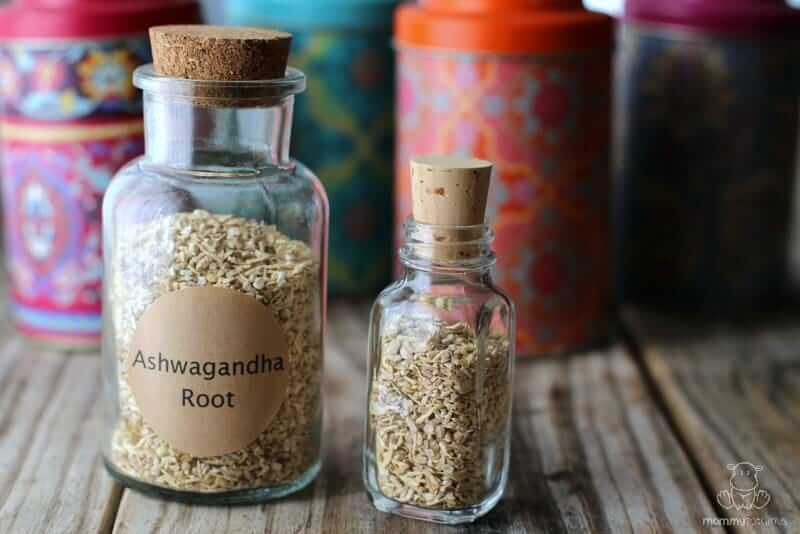Ashwaganda Benefits and Uses
I’m not gonna mince words . . .
The fact that ashwagandha translates literally as “smells like a horse” is not something I consider a selling point. But many experts believe the intended meaning is more like “strong as a horse,” and that’s something this DO ALL THE THINGS mama can totally get behind. As a bonus, ashwagandha’s botanical species name, somnifera, means restful sleep. Who doesn’t want more of that? (Psst! Here are some tips if you’re not waking up refreshed.)
Okay, back to ashwagandha. We all know that life is TOTALLY EASY and never stressful, but there is a percentage of the population (say, um, 99.99%) that sometimes finds themselves in need of some extra support during challenging experiences.
In times like those, ashwagandha (Latin name Withania somnifera) is a fantastic adaptogen to have on hand. Like other herbs in this category, it helps the body adapt to stress by nudging the body toward balance in whatever way is needed.
What I love most about this particular herb is how versatile it is. According to Donald Yance, clinical herbalist and author of Adaptogens in Medical Herbalism, ashwagandha is “an excellent overall tonic that should be incorporated into everyone’s daily adaptogenic formula(s).” (Except pregnant women – see notes below.)
He adds that, “Ashwagandha, like eleuthero, is a well-balanced herbal adaptogen that is well suited for all people, although it is best combined with other plant adaptogens to optimize herbal synergy.” (Source: Adaptogens in Medical Herbalism) You can find a list of adaptogens that it can be blended with here.

Benefits of Ashwagandha
According to Adaptogens: Herbs for Strength, Stamina and Stress Relief, “Most adaptogens are stimulating; ashwagandha is a bit unusual in that it is a calming adaptogen.”
It is considered helpful for:
- restful sleep (source 1, source 2)
- encouraging a sense of well-being (source 1, source 2)
- immune support (source1, source 2)
- memory and cognitive support (source 1, source 2)
- supporting normal energy levels
- delivering antioxidants – ashwaganda is rich in withanamides (source)
Additional animal studies suggest it may have a positive effect on bone mineralization (source
Is ashwagandha safe during pregnancy and breastfeeding?
According to the Botanical Safety Handbook: 2nd Edition, ashwahandha is a Safety Class 2B herb, which means it is not recommended for pregnancy due to conflicting reports about whether it may act as an abortifacient.
With regard to breastfeeding, ashwagandha has long been used in the Ayurvedic tradition to support lactation.
How much is recommended?
Adaptogens are herbs rather than pharmaceutical drugs, so there are no dosages. However, herbalists do share knowledge about what methods of consumption seem to produce a beneficial effect for most people.
The suggestions below are based on those found in Adaptogens: Herbs for Strength, Stamina and Stress Relief by ethnobotanist David Winston and herbal expert Steven Maimes. It’s an excellent resource for anyone who wishes to learn more about adaptogens, complementary herbs that blend well with them, and practical uses both from a culinary perspective and with animals.
- For a 1:5 tincture – which is 1 ounce dried ashwagandha by weight, mixed with 5 ounces of 60 proof or higher alcohol and allowed to infuse for six to eight weeks – 30-40 drops, three times per day. Another option is to buy a pre-made tincture like this one and follow the instructions on the label after talking with your healthcare provider.
- As a decoction – Add 1/2 teaspoon dried ashwagandha root to 8 ounces water and simmer over low heat for about 30 minutes, then let infuse for an additional 30 minutes. Strain and take 3-4 ounces three times per day.
- Capsules – One 400-500 mg capsule, twice per day.
What else do I need to know about ashwagandha?
Ashwaganda is in the nightshade family, so it is recommended that you avoid ashwagandha if you are sensitive to nightshades. Also, ashwagandha is not recommended for individuals that have excessive iron levels, or have hyperthyroidism. Also, please check with your healthcare provider before using any herbal remedy.

Aucun commentaire